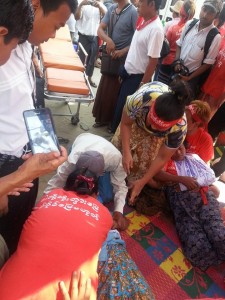Burma Uses Old Tactics to Silence the People
By Burma Partnership • December 9, 2013 Enact a repressive law, use thugs to crackdown, arrest and imprison protesters – it’s a strategy that never gets old for the Burmese authorities.
Enact a repressive law, use thugs to crackdown, arrest and imprison protesters – it’s a strategy that never gets old for the Burmese authorities.
With the ongoing implementation of such a strategy, it has become more clear than ever that Burma does not tolerate critical voices that question the acts of the government or its cronies. The country has witnessed crackdowns and widespread and systematic arrests of peaceful demonstrators and activists throughout President Thein Sein’s term in office. Many of them have been charged under Article 18 of the Peaceful Assembly and Peaceful Procession Law, as well as Section 505 (b) of the Penal Code, and the number is growing every day.
The latest crackdown came on 7 December in Michaungkan Quarter of Thingungyun Township, Rangoon, where more than 200 protestors were demanding the return of land that they claimed was confiscated by the Burma Army in 1990, the time when protesting against the military regime was out of the question. At least 8 protestors were injured as a group of men in civilian clothes armed with batons who claimed to be “cleaning workers from the army” attacked the peaceful protestors. Since the protest started on 26 November, two protest leaders have been arrested and sentenced to three months in prison each. Township authorities have told the demonstrators to disband their protest site or face forceful removal.
On 5 December, two young activists who walked to Laiza in Kachin State earlier this year to show solidarity with the Kachin people in the face of ongoing armed conflict were sentenced to 7 months in prison each. Some members of the Peace Network who participated in a peaceful march in Rangoon to commemorate International Peace Day in September 2012, will finally hear their sentences this month after a long and tiring legal process in several different township courts in Rangoon. On 26 November, two members of the Kachin Peace Network who also organized the march were given fines in two of the townships the march passed through. The message here is clear: do not question government’s peace process.
Two weeks ago, 6 activists, who are involved in protests against violent crackdown on Letpadaung Copper Mine protestors in November 2012, were sentenced to one month to prison each. Among them was student activist D Nyein Linn who was released under a conditional presidential pardon in 2011 and will now have to serve one month plus the remaining 10-year prison term from his previous sentence as a result of the conditional release. This is particularly worrying since most of the activists who were granted amnesty by Thein Sein’s administration were released under the condition that they would have to serve the remaining prison term should they commit any other offense.
It is alarmingly disturbing to see that these oppressive laws continue to be used inconsistently to target specific activist groups and individuals who question the government’s misconduct. Other Letpadaung protestors were arrested with defamation charges under Section 505(b) of the Penal Code for burning a Chinese flag, while widespread protests against the Organization for Islamic Cooperation and the call for citizenship for Rohingya people carrying hateful massages have gone unpunished.
Meanwhile, the demand for the repeal of the Peaceful Assembly and Peaceful Procession Law has been growing stronger particularly among the social justice movement community that has fallen victim under the law and that claims the law violates the right of freedom of expression provided in the 2008 Constitution. However, it comes as no surprise that these groups have now faced more charges under this very same law for campaigning against it.
As Burma opens up, it is inevitable that the country will see more people exercising their freedom of speech, especially those who are impacted by the government’s misconduct, investments and development projects. President Thein Sein must ensure that authorities at all levels respect the universal rights to freedom of assembly, association and expression and avoid violent crackdowns on protestors. Parliament must amend the peaceful assembly law without delay and ensure that new laws guarantee the freedoms of assembly, association and expression. The international community that has been praising Burma’s reform and release of political prisoners must admit that prisoner pardons ahead of every high profile foreign dignitary’s visit to the country and coinciding with important international forums, such as the Human Rights Council, are merely a game of give and take. Now as 2013 comes to an end, the international community must apply real pressure on the Burma government to respect the people’s freedoms of assembly, association and expression and ensure that Thein Sein not only keeps his promise to free all remaining political prisoners before the end of 2013, but also does not put any new activists behind bars.
Tags: Burma Partnership, Peaceful Assembly and Procession Law, ProtestThis post is in: Blog
Related PostsBurma Partnership Celebrates Continuing Regional Solidarity for Burma and Embraces the Work Ahead for Progressive Voice
Burma Army Displays Blatant Disregard for 21st Century Panglong Peace Process
Ann Din Coal Power Plant: Local Movement and Action to Preserve and Protect Natural Resources and Land: Mon IDP Report Case Study #4
Latest Human Rights Abuse Case Demonstrates Urgent Need to Reform the Myanmar National Human Rights Commission
Human Rights Far From Guaranteed as US Sanctions on Burma Are Removed









 All posts
All posts